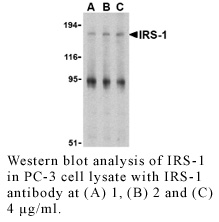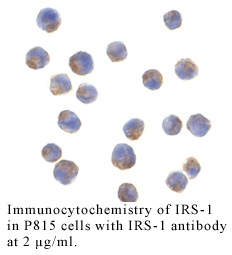Anti-Human Insulin Receptor Substrate-1 (IRS-1) Antibody
Data
- -
- -
Antibody DetailsProduct DetailsReactive Species Human Host Species Rabbit Immunogen PN:I-482 Product Concentration 0.5 mg/ml Formulation This polyclonal antibody is formulated in phosphate buffered saline (PBS) pH 7.4 containing 0.02% sodium azide as a preservative. Storage and Handling This polyclonal antibody is stable for at least one week when stored at 2-8°C. For long term storage, aliquot in working volumes without diluting and store at –20°C in a manual defrost freezer. Avoid Repeated Freeze Thaw Cycles. Country of Origin USA Shipping Next Day Ambient RRIDAB_2830702 Each investigator should determine their own optimal working dilution for specific applications. See directions on lot specific datasheets, as information may periodically change. DescriptionSpecificity Rabbit Anti-Human Insulin Receptor Substrate-1 (IRS-1) recognizes Human and Mouse IRS-1. This polyclonal antibody was purified using affinity chromatography. Background Following tyrosine phosphorylation, the insulin receptor substrate 1 and 2 (IRS-1 and IRS-2) can form a protein scaffolding for the assembly of a host of Src homology 2 (SH2) domain-containing proteins.1 IRS-1 tyrosine phosphorylation can occur through the activity of several cytokine and growth factor receptors such as interleukin (IL)-4, IL-9, interferon-α, in addition to the insulin and insulin-like growth factor 1 receptors.2 The scaffolding provided by IRS-1 and IRS-2 is necessary for insulin signal transduction across the cell membrane. IRS-1 tyrosine phosphorylation, and thus formation of the IRS scaffolding is inhibited by tumor necrosis factor (TNF), and this inhibition can itself be blocked by rapamycin, an inhibitor of the mammalian target of rapamycin (TOR)>3,4 TNF activity could also be blocked by inhibition of the Akt kinase and the PTEN tumor suppressor, suggesting that TNF impairs insulin signaling through IRS-1 by activation of the TOR signaling pathway.3 Antigen DetailsReferences & Citations1. Giovannone, B. et al. (2000) Diabetes Metab. Res. Rev. 16:434 2. Waters, SB. et al. (1996) Trends in Cell Biol. 6:1 3. Ozes, ON. et al. (2001) Proc. Natl. Acad. Sci. USA 98:4640 4. Shamji, AF. et al. (2003) Mol. Cell 12:271 Technical Protocols |
Related Products
- -
- -
Prod No. | Description |
|---|---|
I-465 | |
I-482 |
 Products are for research use only. Not for use in diagnostic or therapeutic procedures.
Products are for research use only. Not for use in diagnostic or therapeutic procedures.




